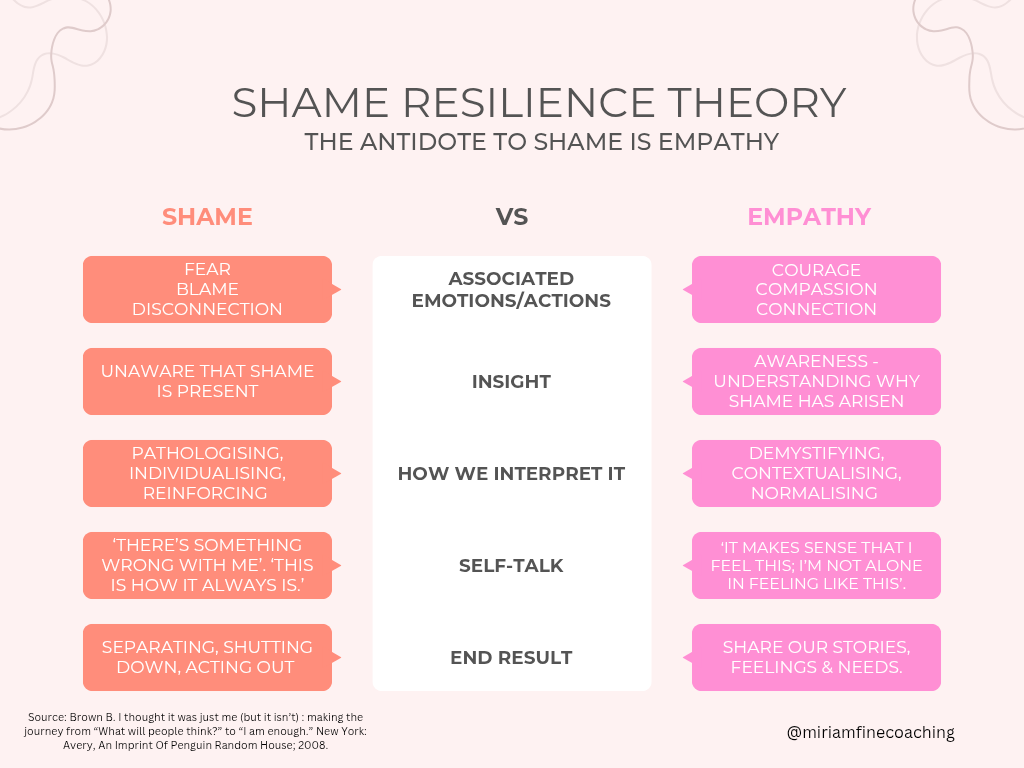That deep, dragging feeling that creeps up on you, when you're feeling destabilised. The terror that dissolves your self confidence and undermines your sense of who you are. That fuels your questioning ‘what’s wrong with me?!’ and creates a defeated sense of not being good enough. That feeling, which all of us succumb to sometimes, is called shame. (Stay with me, it gets less icky and more hopeful if you keep reading…🙏🏼😂)
Shame is one of the most painful emotions we experience, and yet some of us (whether we realise it or not) grapple with it on a regular basis. As humans, we're social animals, and so when shame makes us feel we may be rejected by everyone we depend on for survival, that's pretty terrifying.
I've found shame to be the real kicker, the common thread, for so many of life's emotional challenges - both personally and with the clients I work with.
So, what's the antidote to shame, then? (And the inspiration for this post?)
Empathy. And compassion. And that includes compassion that we give ourselves (though sometimes that can be harder to access, from within a shame spiral).
[As I opened my Mindful Self-Compassion Teacher Training textbook this morning and saw that our next session is focused on meeting shame with gentleness and compassion, I was reminded of how long I've been meaning to share some writing on this topic, and felt inspired.]
If we're experiencing the emotion of shame, and we then feel empathy and compassion (in other words, we feel heard, acknowledged, validated, understood, not alone, and cared about), our shame starts to dissipate and we can emerge from the spiral.
You'll see how that works in just a sec. Tiny (promise!☺️) preamble first:
Years ago, I read one of Brené Brown's early books, which was an exploration of her dissertation research on shame (if you don't know Brené Brown, she's a social worker, researcher of human emotions, and author). The book is called ‘I thought it was just me, but it isn't.’, and it explains Shame Resilience Theory, summarised in the diagram below. I really rate how useful this is, and still recommend this book to clients on a regular basis.
In the diagram, you'll start to see the reasons why empathy is the perfect antidote to shame. Why human connection saves us from the terror of disconnection.
Features of the shame experience are listed on the left hand side, and features of empathy on the right. The middle column explains which feature is discussed on each row.
In the interest of brevity, I won't expand on all the components this time, but let me know if you would appreciate that, and I can do in future (or shout if there are words etc that need explaining now).
So what does this all mean?
Well, we tend to dip more into shame when times are tough, when tensions are running high, and when stress levels are up (anyone relating to that right now? I know it's not just me). It's part and parcel of how we tend to become more critical and blaming, as a protective mechanism.
The power in starting to learn the language of shame (and particularly in recognising our own shame experiences for what they are), is that we can - at some point along the way - interrupt that shame spiral.
Because, when we're unaware, shame keeps going, doing it's thing:
Leading us to feel there's something wrong with us (pathologising).
Making us feel we're unworthy.
And that we must keep our ‘shameful’ reality a secret.
Encouraging us to go silent and shut ourselves off from others.
Which perpetuates the whole thing, as we feel more and more alone and stuck.
But if, somewhere along the way, we can notice ‘ah, this is shame’, and encourage ourselves to break that cycle, we unlock the possibility of:
Recognising that this is a common human experience - we all feel this way sometimes.
And that there is nothing wrong with us - we're simply reacting to our experiences like anybody else.
And we are not alone.
So perhaps we speak to trusted loved ones or professionals, allowing us to feel connected and soothed by compassion.
And then we learn that our experiences are not so ‘insane’ after all.
If you're interested in getting to know parts of yourself that might be acting as inner critics, or may be feeling shame from being criticised, check out this mini-guide I made recently. It takes you through a short exercise to get to know these parts of you, and perhaps start extending compassion towards them (though no rush to do that - be guided by what feels right for you).
The meditation/exercise I shared last week is also a great resource for transforming shame through compassion.
Note: This post was written almost entirely on a National Express bus home from Bristol, so let me know if any links don't work!
All that leaves me to say is…
☀️Happy Solstice! (If you're on Instagram, here's a snippet from the beginning of my solstice weekend, which was filled with lovely friends, paddleboarding, godson cuddles, and yoga by the lake).
😌Wishing you a soothing and grounding week ahead, and I look forward to catching you here again next weekend!
Miriam x




